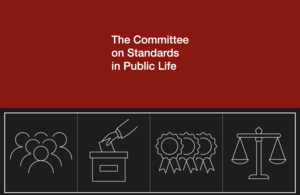Committee on Standards in Public Life announces review of electoral regulation
The independent Committee on Standards in Public Life has today announced a review of the regulation of elections.

Logo featuring a group of people, ballot box, party rosettes and scales of justice.
The independent Committee on Standards in Public Life has today announced a review of the regulation of elections.
The Committee is starting a public consultation inviting views on the way donations and campaign expenditure by candidates, political parties and non-party campaigners in election and referendum campaigns are regulated and enforced by the Electoral Commission, the Crown Prosecution Service (CPS) and the Police.
Announcing the review, Chair of the Committee on Standards in Public Life, Jonathan Evans said:
“Our review will look at what the regulation of election finance should achieve and how it is regulated. That will involve examining the Electoral Commission’s role as a regulator of election finance, along with the work of the police and CPS in this area. We intend to look at electoral regulation from first principles – what really matters in this area? What values and principles should guide regulation of finance during elections?
“Our predecessors on the Committee recommended the setting up of the Electoral Commission in 1998 and last looked at its work in 2007. Since then, digital campaigning has revolutionised the way parties and campaigners engage with voters. It has made it harder to track how much is being spent, on what, where and by whom. This review will look at the system for the regulation of election finance and whether it meets the challenges of elections in the 21st century. We are not reviewing wider aspects of the Commission’s work in this review or looking at how political parties raise funds.
“We are keen to hear from anyone who has experience or views on the regulation of party finance. We particularly want to hear from those with first-hand experience of regulating or being regulated and from third party campaigners. We need your input.
“Fair and free elections are the basic tenet of democracy. Voters should feel confident that campaigners operate on a level playing field and that political finance is robustly, transparently and effectively regulated during elections. We intend to report with any recommendations by June 2021.”
Notes to Editors
-
Interview requests and media enquiries should go to Maggie O’Boyle on 07880 740627.
-
The independent Committee on Standards in Public Life advises the Prime Minister on ethical standards across the whole of public life in the UK. It monitors and reports on issues relating to the standards of conduct of all public office holders. To find out more about the Committee’s work go to https://www.gov.uk/government/organisations/the-committee-on-standards-in-public-life
-
The current members of the Committee are: Lord (Jonathan) Evans KCB DL, Chairman, Rt Hon Dame Margaret Beckett DBE MP (Labour), Dr Jane Martin CBE, Dame Shirley Pearce DBE, Jane Ramsey, Monisha Shah, Rt Hon Lord (Andrew) Stunell OBE (Liberal Democrat) and Rt Hon Jeremy Wright QC MP (Conservative).
-
You can follow the Committee on twitter @PublicStandards.
-
The Terms of Reference for the Committee’s review into electoral regulation are to:
I. Identify the principles and values that should underpin the regulation of donations and campaign expenditure by candidates, political parties and non-party campaigners in election and referendum campaigns.
II. Examine the Electoral Commission’s remit as a regulator of election finance and associated electoral law. This will include consideration of whether the Electoral Commission requires new powers to allow it to fulfil its role as a robust regulator, including powers to compel the provision of documents by third parties such as social media companies, to require greater transparency on party spending on campaign activity and to protect the electoral process from the influence of foreign players.
III. Examine the enforcement regime for election finance offences committed by candidates, parties and non-party campaigners. The review will examine how the civil sanctions regime interacts with the prosecution regime and consider whether it works effectively as a complete system. This will include consideration of the role of the Electoral Commission, the police and the relevant prosecuting authorities in handling breaches of election finance laws.
IV. Consider whether the Electoral Commission should play a role in criminal prosecutions for breaches of election finance laws.
V. Consider whether the Electoral Commission’s civil sanction regime should be expanded to cover the enforcement of candidate finance laws, in addition to its current civil sanctions powers that apply to party and non-party campaigner finance laws, under a single regulatory framework for candidates, parties and non-party campaigners.
The following areas are within the scope of this inquiry:
- The regulatory functions and powers of the Electoral Commission
- The relevant functions of the police and the relevant prosecuting authorities
The following issues are outside the scope of this inquiry:
- Matters relating to the arrangements for funding political parties.
- Matters relating to the regulation of elections that are devolved, although where applicable, lessons will be learnt from experiences in the devolved administrations.
- Matters relating to the Electoral Commission’s role in overseeing elections and developing public awareness campaigns.